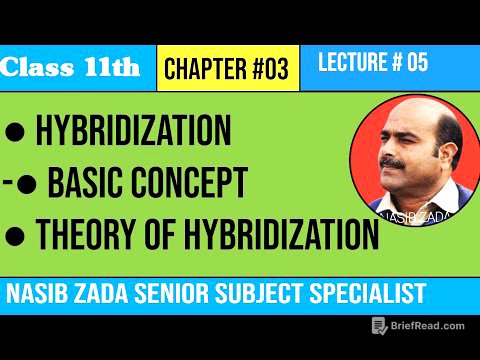TLDR;
This video provides an introduction to the study of Mesnevi-i Nuriye, focusing on understanding the text through five key points. It emphasizes the importance of approaching the text with an open heart and mind, aiming for personal transformation and spiritual healing. The lesson begins with a discussion of Tawhid (the Oneness of Allah), differentiating between believing in Allah's unity and truly internalizing this belief in all aspects of life.
- Importance of Tawhid
- Reading Mesnevi-i Nuriye with open heart and mind
- Aiming for personal transformation and spiritual healing
Introduction to the Lesson [0:00]
The lesson is the third in a series, focusing on the Mesnevi-i Nuriye. The speaker emphasizes the importance of the five key points for understanding the text, which is described as a journey of inner contemplation. The Mesnevi-i Nuriye is likened to a seedling of the Risale-i Nur, containing summarized truths. The speaker notes that some topics may be difficult to understand for those with high city, and the approach will be to understand the text in layers of meaning, with the intention of benefiting from it.
Features of Mesnevi-i Nuriye [3:50]
The Mesnevi-i Nuriye appeals to both the mind and heart, aiming to heal spiritual diseases and protect against negative influences. It seeks to rebuild the unity of mind and heart, drawing inspiration from Imam Ghazali, Imam Rabbani, and Mevlana Celaleddin-i Rumi. The text aims to transform intentions and rebuild one's inner market, referencing Mevlana's Mesnevi in its concise declaration of truth.
Starting with Lemas Section [7:20]
The lesson starts with the Lemas section, which corresponds to 22 words in the Risale-i Nur. The speaker reiterates the importance of reading the text with an open heart and mind, believing in its transformative power. The text will address the reader directly, and the rebuilding effort it offers will begin with Tawhid.
Tawhid: The Unity of Allah [9:32]
The lesson begins with Tawhid, the unity of Allah, aiming to deepen understanding and facilitate spiritual healing. Tawhid is understood not only as the belief in Allah's singular essence but also in His actions and disposition. It's crucial to recognize that Allah has no partners in His actions, contrasting with beliefs that attribute disposition to reasons or causes.
Heedlessness and Ignorance [13:31]
The text addresses the "heedless antichrist" who attributes events to causes, cautioning against this heedlessness and ignorance. Attributing effects to causes is described as a subtle form of polytheism. Agnosticism, which separates the God-Universe relationship, is also identified as a problem in the modern world. The belief in Tawhid asserts that Allah's divinity is singular, without partners in either essence or action.
Saving Faith from Imitation [17:27]
The lesson aims to transform faith from imitation to a state of certainty and conviction. The speaker emphasizes that being born into a Muslim country does not automatically make one a true believer; rather, one must actively seek and find Islam. This involves questioning and investigating one's beliefs to establish them on a foundation of truth.
Monotheism as the Main Theme [22:12]
The lessons on monotheism follow the Risale-i Nur, with monotheism as the central theme. The most fundamental issue that leads people astray is the relationship between causes and effects, and the relationship between existence and Allah. The lesson will start from this point, with Bediuzzaman Hazrat addressing those who attribute events to causes.
Method of Interpretation and Verses [24:28]
Bediuzzaman will use a new method of interpretation, different from classical narration interpretations. He will present a truth, then base it on verses, interpreting the meaning of the verses. Verses from Surah Az-Zumar and Surah Yasin are cited to emphasize that Allah is the creator of everything and that control and disposition of everything are in His hands.
Allah's Actions and Disposals [28:38]
Verses from the chapter of Hud and Najm are mentioned to highlight Allah's actions and disposals. The lesson emphasizes understanding Allah through His disposition in the inner mirror, rebuilding the inner world by accepting this truth. The speaker cautions against viewing external events as separate from Allah's will.
Declaring the Truth of Tawhid [32:16]
The lesson emphasizes declaring the truth of Tawhid, recognizing that the real owner of property and the source of effects is the eternal power of Allah. Causes are merely duty-bound officers, and their importance lies in being conditions for Allah's creation of results. The reasons are announcers of the orders coming from the Power circle.
Honor and Majesty Necessitate the Curtain [36:32]
Honor and majesty necessitate the curtain of causes, and Tawhid rejects attributing power to these causes. Shirk (polytheism) is defined as giving effect to causes and not seeing the hand of Power behind them. Hz. Luqman advises against polytheism, calling it a great injustice.
Living in a Circle of Causes [41:30]
The lesson addresses living in a circle of causes, where it's easy to attribute power to causes rather than to Allah. Using active language that implies causes have real power can lead to polytheism. It's important to recognize that Allah is the one who makes things happen, and causes are merely conditions.
Sultan as an Example [45:22]
The example of a Sultan is used to illustrate the truth of divinity. The Sultan's officers are not partners in his rule but rather convey his commands. Similarly, the reasons are not partners in Allah's divinity but rather announce His power. They are observers and witnesses, performing a kind of worship by obeying Allah's orders.
Technical and Legislative Orders [52:50]
The lesson distinguishes between technical (creation) and legislative (Sharia) orders. Beings worship Allah by fulfilling their duties and obeying His orders. The sun, for example, fulfills its duty by reflecting certain divine names.
Curtain of Glory and Grandeur [1:00:26]
The causes are a curtain for Allah's glory and grandeur, protecting the heedless and ignorant from complaining about Allah. The example of Hz. Azrail (peace be upon him) is used to illustrate this point. Allah creates death, but also creates curtains of calamities and diseases to shield people from directly complaining about Him.
Complaining About Reasons [1:10:24]
Complaining about reasons stems from negligence. It's important to remember that Allah created death and is free from cruelty. While we strive to eliminate cruelty in the circle of causes, we must also recognize that Allah is the creator of death.
Wisdom and Beauty in Creation [1:13:39]
In the eyes of the heedless and ignorant, there may be ugliness in creation, but in reality, there is wisdom and beauty. The curtain of causes protects us from directly complaining about Allah. The goal is to eliminate heedlessness and see the beauty and wisdom behind the events.
Summary of the Lesson [1:20:47]
The lesson concludes by stating that honor and glory want the causes to always be seen as the hand of Power, while Tawhid and Jalal want the causes to take their hands off the effect. By catching this balance, we can be loved by Allah and open ourselves to the wisdom behind the curtain of reasons. The Mesnevi-i Nuriye will help us contemplate the ignorance and heedlessness of our souls, and in the effort to rebuild our being, we will try to see the hand of Power behind a transparent curtain.









